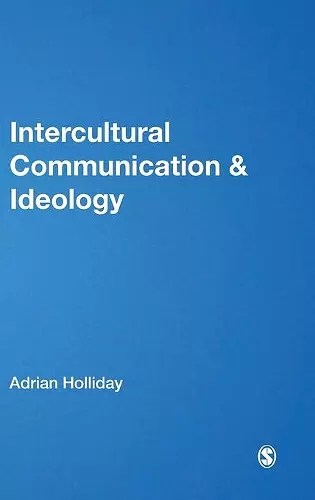Intercultural Communication & Ideology
Format:Hardback
Publisher:Sage Publications Ltd
Published:10th Dec '10
Currently unavailable, and unfortunately no date known when it will be back
This hardback is available in another edition too:
- Paperback£44.99(9781847873873)

Taking on issues normally left in the margins, Intercultural Communication and Ideology revises the way we think of intercultural communication by insisting that we consider its ideological component. In this brilliant and engaging book about culture and the interstices that comprise the grounds for our interactions, Adrian Holliday shows us the necessity for a cosmopolitan process that expands the basis of our intercultural work.
- Molefi Kete Asante, Temple University
"Adrian Holliday’s highly readable and thought provoking volume is a welcome addition to the existing body of work on intercultural communication and ideology... With its comprehensive coverage of studies in the field and critical discussion of dominant theoretical paradigms, this refreshing book provides a valuable resource for both students and experienced researchers but also everyone interested in intercultural communication. An authoritative and open minded book the field will embrace."
- Jo Angouri, University of the West of England
Although communication is central to the humanities and social sciences, the inter-cultural level is often, peculiarly, left out of accounts. So what is intercultural communication? How does it relate to global processes and questions of identity? This comprehensive book examines the main features of intercultural communication. It critically examines the main positions in the field. It addresses intercultural communication within the context of global politics, both addressing the specific problems that derive from Western ideology and setting out an agenda for research.
The book investigates categories of cultural action and itemizes the machinery for the illumination of inter-cultural processes. Holliday shows how a dialogue between national structures and creative universal cultural skills can be carried on in new locations, relating intercultural communication to theories of multiculturalism, cosmopolitanism and globalization, while also exploring how ideology permeates inter-cultural processes and develops an alternative ′grammar′ of culture.
Taking on issues normally left in the margins, the author of Intercultural Communication and Ideology has revised the way we think of intercultural communication by insisting that we consider its ideological component. In this brilliant and engaging book about culture and the interstices that comprise the grounds for our interactions, Adrian Holliday shows us the necessity for a cosmopolitan process that expands the basis of our intercultural work. This is a compelling book that should be read by scholars and the general public alike. It is accessible, factual, and clear
Molefi Kete Asante
Professor, Department of African American Studies at Temple University and author of ′Erasing Racism: The Survival of the American Nation′
Adrian Holliday’s highly readable and thought provoking volume is a welcome addition to the existing body of work on Intercultural Communication and Ideology. The rich dataset and analysis of well selected excerpts challenge essentialistic understandings of the notion of culture and linguistic behaviour. With its comprehensive coverage of studies in the field and critical discussion of dominant theoretical paradigms, this refreshing book provides a valuable resource for both students and experienced researchers but also everyone interested in Intercultural Communication. An authoritative and open minded book the field will embrace
Jo Angouri
Senior Lecturer in Linguistics and Intercultural Communication, University of the West of England, Bristol
For interculturalists who feel limited by the essentialistic constraints of the individualismllectivism divide and by the West′s propensity to define culture as nationality, Intercultural Communication and Ideology offers a refreshing and more complex frame for analyzing and theorizing intercultural communication. Advocating a critical cosmopolitan approach as analytical frame, Holliday attends to the influence of ideology and the marginalization of non-Western cultural realities typical within traditional schools of thought in intercultural communication studies. A must read for those interested in understanding and analyzing intercultural interactions in more complex ways than offered by traditional Western perspectives
Dreama G. Moon
Professor, California State University, San Marcos, CA, USA
ISBN: 9781847873866
Dimensions: unknown
Weight: 480g
240 pages